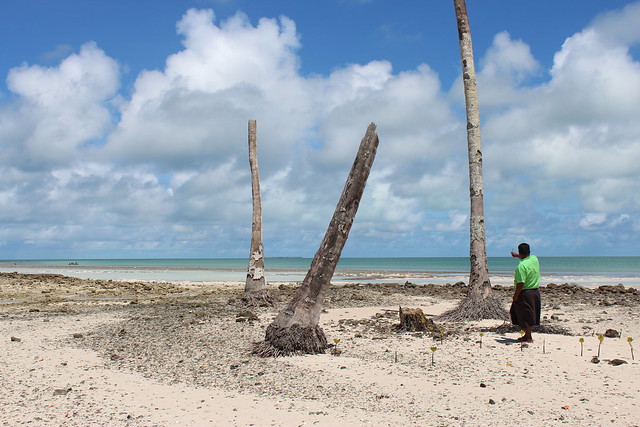South Pacific security at Shangri-La

The South Pacific calls global warming its top security threat. And China’s arrival is warming discussion of island security.
Both trends explain why, for the first time in its 18-year history, Singapore’s Shangri-La Dialogue had a session on the islands: ‘Strategic interests and competition in the South Pacific’.
The secretary general of the Pacific Islands Forum, Dame Meg Taylor, said not since World War II and the Cold War had the islands been so strategically relevant.
Drawing on the words and spirit of last year’s Pacific Islands Forum communique, Taylor said the region is ‘complex and competitive’, with a dynamic marked by both ‘cooperation and competition’.
The commander of Fiji’s military, Rear Admiral Viliame Naupoto, observed that three major powers are having an impact on the South Pacific: the US, China and climate change.
‘Of the three’, Naupoto said, ‘climate change is winning and climate change exerts the most influence on countries in our part of the world. If there’s any competition, it’s with climate change.’
Taylor said the islands had decided to ‘securitise the climate emergency’ by expanding the concept of security. Like all the speakers on the South Pacific panel, she referred to the first point of the forum’s Boe declaration on regional security:
We reaffirm that climate change remains the single greatest threat to the livelihoods, security and wellbeing of the peoples of the Pacific and our commitment to progress the implementation of the Paris Agreement.
The commander of US Indo-Pacific Command, Admiral Philip Davidson, said in all his visits to the islands he was confronted by the region’s description of climate change—‘robustly and literally’—as an existential threat, from fresh water and liveable land to natural disasters.
The head of international relations and strategy at the French defence ministry, Alice Guitton, said France, Australia, New Zealand and the US must coordinate responses to island security needs. She said the four powers should improve their cooperation for maritime surveillance, preparedness for humanitarian and natural disasters, and measuring infrastructure at risk.
Sitting with Guitton, the secretary of Australia’s Department of Foreign Affairs and Trade, Frances Adamson, said that it was a mark of changing times that Australia and France were ‘embracing each other’ in the islands. That was a wry Adamson nod to the way Australia’s 20th-century dread of France in the Pacific has now turned into a desire that France stay and contribute as a key strategic partner.
Australia, the quintessential status quo power in the South Pacific, sees France as a bastion of the existing order. No longer is France the feared outsider prone to blowing up both bombs and its own interests in the region.
New outsiders are causing Canberra to fret.
Adamson said Australia has ‘an abiding interest in the sovereignty and security of the South Pacific’, but added that ‘Australia does not see our region through a narrow lens of strategic competition…Our approach should be driven by the wellbeing of the blue Pacific and its peoples.’
In an elegant alliteration, the foreign affairs secretary said Australia wants a South Pacific that is ‘secure, stable and sovereign’.
During questions, China joined climate change in the security discussion.
Taylor’s response was a brief recap of the friends-to-all policy she laid out in her February speech, ‘The China alternative: changing regional order in the Pacific islands’.
The Pacific Islands Forum saw expanded roles for other countries in the region, she said, and China has ‘a very strong and valued relationship with many members of the forum’.
Davidson repeated recent US criticism that Beijing is putting pressure on the government of Manasseh Sogavare in Solomon Islands to drop diplomatic recognition of Taiwan in favour of China.
‘The concern is the coercive approach to force Solomon Islands to switch recognition’, he said. ‘That is certainly not the objective of our free and open Pacific vision, nor is it in alignment with that free and open vision.’
The admiral’s description of China’s actions draws on the critique he offered the US Senate in February:
Beijing is leveraging its economic instrument of power in ways that can undermine the autonomy of countries across the region. Beijing offers easy money in the short term, but these funds come with strings attached: unsustainable debt, decreased transparency, restrictions on market economies, and the potential loss of control of natural resources.
Davidson’s language was what you’d expect from a US admiral. When it comes to senior diplomats, usually you get a certain flexibility that presents as nuance. There was no softness, though, from Adamson.
Australia’s top diplomat was asked about the decision by Australia and the US to redevelop the Lombrum naval base on Papua New Guinea’s Manus Island.
First, Adamson did proper diplomatic duty, stating that PNG had ‘invited’ Australia and the US to help and that ‘this is definitely not going to be an Australian naval base or a US naval base.’
The thought that follows is that, crucially, it won’t be a Chinese naval base.
Canberra was galvanised last year by the prospect of a Chinese-developed port on Manus, along with possible Chinese development of other PNG harbours at Wewak, Kikori and Vanimo.
As ASPI commentary noted, the real strategic value of Manus lies in its forward position to monitor and control air and sea activities in the archipelagic approaches to Australia and the wide sweep of the Pacific from Micronesia to Kiribati and Nauru to Solomon Islands.
The Shangri-La session on strategic interests and competition in the South Pacific heard Adamson express Oz interests in language any admiral would endorse: ‘The Australian government made it clear that any foreign base in the region would not be welcome. We would strongly condemn and oppose that. It would have obvious negative impact on Australia’s strategic situation and the strategic situation of the region.’
Strongly condemn and oppose. No code there.
Welcome to a complex and crowded South Pacific.